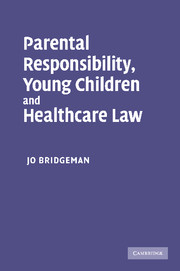Book contents
- Frontmatter
- Contents
- Acknowledgements
- Table of cases
- Table of legislation and international instruments
- 1 Parents, young children and healthcare law
- 2 Child-centred healthcare services for children
- 3 Child health and parental obligations
- 4 In the best interests of the child?
- 5 The quality of life of severely disabled children
- 6 Obligations and caring responsibilities
- 7 Relational responsibilities
- Bibliography
- Index
1 - Parents, young children and healthcare law
Published online by Cambridge University Press: 17 July 2009
- Frontmatter
- Contents
- Acknowledgements
- Table of cases
- Table of legislation and international instruments
- 1 Parents, young children and healthcare law
- 2 Child-centred healthcare services for children
- 3 Child health and parental obligations
- 4 In the best interests of the child?
- 5 The quality of life of severely disabled children
- 6 Obligations and caring responsibilities
- 7 Relational responsibilities
- Bibliography
- Index
Summary
Introduction
Being a parent brings with it manifold social, moral and legal responsibilities in relation to the physical, emotional and intellectual growth and development of the child as well as his or her safety, security, happiness and well-being. The purpose of this book is to examine the role of parents in caring for the health and well-being of young and dependent children. In the chapters which follow there is an examination of the range of care undertaken by parents from the everyday management of the health of children, to the demands placed upon parents whose child has a life-threatening illness or long-term disabilities, or whose future survival is uncertain due to disabilities arising from prematurity, complications during birth or accidental injury. In addition to undertaking an examination of the existing legal obligations imposed upon parents, this book makes the argument for a new conceptual framework to govern the role of parents in relation to the health of their children. Rather than argue for a legal framework firmly grounded in the rights of young and dependent children, as many commentators do, this book makes the argument for a legal framework situated within the responsibilities of parents and healthcare professionals for the management of children's health.
This book considers the responsibilities of parents and professionals in relation to the health of children who, by virtue of their age, or mental and physical impairments, are dependent upon others to ensure their health and well-being.
- Type
- Chapter
- Information
- Publisher: Cambridge University PressPrint publication year: 2007



